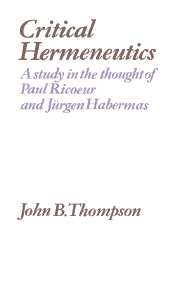Book contents
5 - Problems in the methodology of social science
Published online by Cambridge University Press: 10 December 2009
Summary
The methodology of social science is a topic which attracts the attention of writers within the traditions of ordinary language philosophy, hermeneutic phenomenology and critical social theory. As an exponent of ordinary language philosophy, Winch offers an analysis of the idea of understanding which effectively eliminates explanation from the sphere of social science. The hermeneutic phenomenology of Ricoeur adopts a more complementary approach, seeking to integrate understanding and explanation into a systematic theory of interpretation. The latter approach is shared by Habermas, who employs depth hermeneutics as a framework for critical social theory. In the present chapter, I continue my critical discussion of the three traditions by evaluating these various contributions to the methodology of social science. I maintain, first, that Winch's characterisation of the concept of understanding is untenable, and that his treatment of the problems of adequacy and critique is unsound. Second, I suggest that Ricoeur's recent views on the relation between motive and cause are in need of development; that his theory of interpretation faces a number of difficulties; and that his mediation in the debate between hermeneutics and critical theory raises problems which he has yet to resolve. In the third part of the chapter, I try to show that Habermas's proposals for the programme of depth hermeneutics and the conduct of critique are unsatisfactory in certain respects, and that his desire to forge a unity of theory and practice remains unfulfilled.
- Type
- Chapter
- Information
- Critical HermeneuticsA Study in the Thought of Paul Ricoeur and Jürgen Habermas, pp. 150 - 181Publisher: Cambridge University PressPrint publication year: 1981

